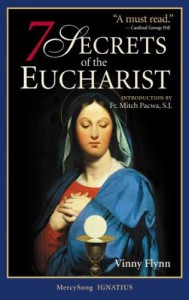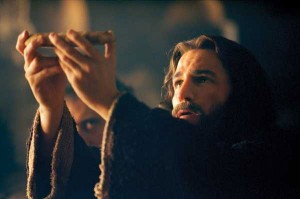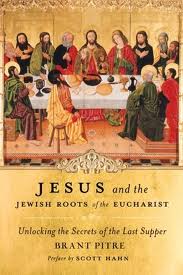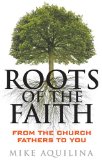Holy Eucharist
[powerpress]
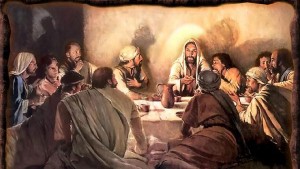 On this faith check let’s talk about the Holy Eucharist.
On this faith check let’s talk about the Holy Eucharist.
Catholics believe that the bread and wine are more than just symbolic reminders. By the power of God working through the priest they are transformed into Christ’s Body and Blood.
Our Lord taught, “Unless you eat the flesh of the Son of Man and drink His blood you do not have life within you.â€1 The Jews scoffed at this and asked, “How can He give us his flesh to eat.â€Â Even His disciples said this was a hard saying and many stopped following Him.
Now when genuine misunderstandings occurred, Jesus corrected His listeners. But Jesus meant what He said, and did not back down: “[M]y flesh is food indeed and my blood is drink indeed … He who eats my flesh and drinks my blood has eternal life, and I will raise him up at the last day.â€
For 2,000 years the Eucharist has been the heart of the Catholic Faith. In fact, the early Christians said, “without the Eucharist we cannot live,†preferring to risk their lives rather than miss Mass. Today He invites each one of us to receive His very flesh and blood.
1-Â All citations from John 6:50 – 58
Tags: catholic apologetics, Catholic Faith, eternal life, eucharist, faith, holy eucharist
This entry was posted on Wednesday, September 4th, 2013 at 12:19 am
You can follow any responses to this entry through the RSS 2.0 feed.
Our conversation with Vinny Flynn, on the  “Seven Secrets of the Eucharist”, is one of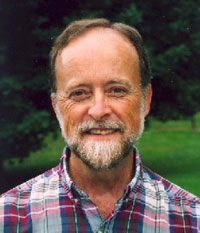 the most popular interviews we have had on the Morning Show. Vinny’s love for the Eucharist pours out in his descriptions of just some of the beautiful “secrets” found in this great mystery and gift to us all.  Find out also the great connection between the Divine Mercy and the Eucharist (it really isn’t a secret…thank you St. Faustina!).
the most popular interviews we have had on the Morning Show. Vinny’s love for the Eucharist pours out in his descriptions of just some of the beautiful “secrets” found in this great mystery and gift to us all. Â Find out also the great connection between the Divine Mercy and the Eucharist (it really isn’t a secret…thank you St. Faustina!).
[powerpress]
If you are looking for new ways to increase your devotion to Our Lord in the Holy Eucharist, this is the book for you, and I suggest you buy several copies for your friends. — Fr. Benedict Groeschel, C.F.R.
This book will change your understanding and experience of the Holy Eucharist in an amazing way. Each of the 7 Secrets of the Eucharist will lead you into the fire of ‘Eucharistic amazement’ called for by Pope john Paul II (Ecclesia de Eucharistia). Fr. George W. Kosicki, C.S.B.
This little book is a real gem. A `must read’ for any Catholic. In fact, I would recommend this book to anyone. –George Cardinal Pell, Archbishop of Sydney
Tags: Benedict Groeschel, divine mercy, eucharist, holy eucharist, ignatius press, morning show, Vinny Flynn
This entry was posted on Sunday, June 2nd, 2013 at 6:55 am
You can follow any responses to this entry through the RSS 2.0 feed.
Episode 15 -The Way of Mystery: The Eucharist and Moral Living– The journey begins into the unitive way…the beginning of falling in love with God. Combined with the entry into the sacramental life, the living out the moral life becomes more than meeting a “goal”, but becomes a “way” of life.
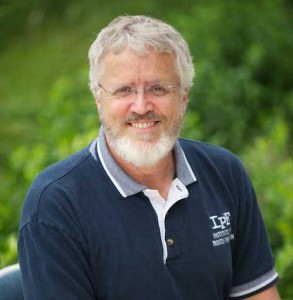
[powerpress]
Deacon James Keating, PhD, the director of Theological Formation for the Institute for Priestly Formation, located at Creighton University, in Omaha, is making available to â€Discerning Hearts†and all who listen, his series of programs entitled “The Way of Mysteryâ€.
 The Vatican II documents remind us that the spiritual journey is not made in a vacuum, that God has chosen to save us, not individually, but as The People of God. The Eucharist must help Christians to make their choices by discerning out of Christ’s paschal mystery. For this process to take place, however, Christians must first understand how the Eucharist puts them in touch with Christ’s passion, death, and resurrection, and what concrete implications being in touch with this mystery has for their daily lives.
The Vatican II documents remind us that the spiritual journey is not made in a vacuum, that God has chosen to save us, not individually, but as The People of God. The Eucharist must help Christians to make their choices by discerning out of Christ’s paschal mystery. For this process to take place, however, Christians must first understand how the Eucharist puts them in touch with Christ’s passion, death, and resurrection, and what concrete implications being in touch with this mystery has for their daily lives.
For more information on the “Institute of Priestly Formation†and for other material available by Deacon Keating, just click here
Don’t forget to pickup a copy of “Communion with Christ†, it is one of the best audio sets on prayer…ever!
Check out Deacon Keating’s “Discerning Heart†page
Tags: choices, creighton university, Deacon James Keating, eucharist, sacramental life, the unitive way, unitive way
This entry was posted on Monday, January 21st, 2013 at 6:12 am
You can follow any responses to this entry through the RSS 2.0 feed.
USCCA18 Chapter 17 part 2-Â The Eucharist: Source and Summit of Christian Life
[powerpress]
Archbishop Lucas offers insights on the US Catholic Catechism for Adults Chapter 17:
The consecrated bread has become Christ’s Body. The consecrated wine has become Christ’s Blood. Jesus Christ is substantially present in a way that is entirely unique. This happens by the power of the Holy Spirit through the ministry of the priest’s or bishop’s acting in the person of Christ during the Eucharistic Prayer. At Mass, when we are offered the Host and hear the statement “The Body of Christ,†we answer, “Amen,†that is, “Yes, I believe.â€
The Most Reverend George J. Lucas leads the Archdiocese of Omaha.Â
For other episodes in the visit our Archbishop George Lucas page
This programs is based on:
More information can be found here.
We wish to thank the USCCB for the permissions granted for use of  relevant material used in this series.
Also we wish to thank Susan Adams for her vocal talents in this episode.
[ezcc]
Tags: eucharist, the mass, united states catholic catechism for adults
This entry was posted on Monday, August 20th, 2012 at 6:05 am
You can follow any responses to this entry through the RSS 2.0 feed.
Show 11 ” Building a Kingdom of Love” – What it means to “put on Christ”
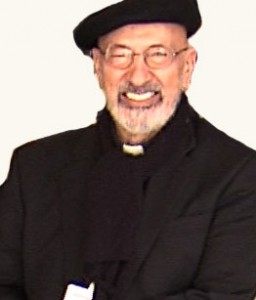
[powerpress]
Msgr. Esseff reflects on St. Paul’s letter to the Ephesians Chapter 4 v. 20 -24:
22 Put off your old nature which belongs to your former manner of life and is corrupt through deceitful lusts, 23 and be renewed in the spirit of your minds, 24 and put on the new nature, created after the likeness of God in true righteousness and holiness. – RCVCE
Msgr. John A. Esseff is a Roman Catholic priest in the Diocese of Scranton. He was ordained on May 30th 1953, by the late Bishop William J. Hafey, D.D. at St. Peter’s Cathedral in Scranton, PA. Msgr. Esseff served a retreat director and confessor to Blessed Mother Teresa.   He continues to offer direction and retreats for the sisters of the missionaries of charity around the world. Msgr. Esseff encountered St.  Padre Pio,  who would become a spiritual father to him. He has lived in areas around the world,  serving  in the Pontifical missions, a Catholic organization established by Bl. Pope John Paul II to bring the Good News to the world especially to the poor. Msgr. Esseff assisted the founders of the Institute for Priestly Formation and continues to serve as a spiritual director for the Institute. He continues to  serve as a retreat leader and director to bishops, priests and sisters and seminarians and other religious leaders around the world. Â
To obtain a copy of Msgr. Esseff’s book byvisiting here
Be sure to visit Msgr. Esseff’s website “Building a Kingdom of  Love”
Tags: blessed mother teresa, ephesians, eucharist, Good News, gospel of john, PA, retreat, st. paul
This entry was posted on Sunday, August 5th, 2012 at 8:38 am
You can follow any responses to this entry through the RSS 2.0 feed.
 VATICAN CITY, 11 JAN 2012 (VIS) 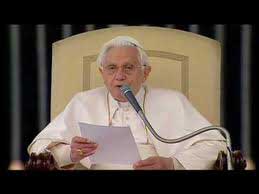
Jesus’ prayer during the Last Supper was the theme of Benedict XVI’s catechesis during his general audience, which was held this morning in the Paul VI Hall in the presence of 4,000 faithful.
The Pope explained how the emotional backdrop to the Last Supper, in which Jesus bade farewell to His friends, was the immanence of His approaching death. Moreover, in the days in which He was preparing to leave His disciples, the life of the Jewish people was marked by the approaching Passover, the commemoration of the liberation of Israel from Egypt.”It was in this context that the Last Supper took place”, the Holy Father said, “but with an important novelty”. Jesus “wanted the Supper with His disciples to be something special, different from other gatherings. It was His Supper, in which He gave something completely new: Himself. Thus Jesus celebrated the Passover as an anticipation of His Cross and Resurrection”.
The essence of the Last Supper lay in “the gestures of breaking and distributing the bread, and sharing the cup of wine, with the words that accompanied them and the context of prayer in which they took place. This was the institution of the Eucharist: the great prayer of Jesus and the Church”. The words the Evangelists use to describe that moment “recall the Jewish ‘berakha’; that is, the great prayer of thanksgiving and blessing which, in the tradition of Israel, is used to inaugurate important ceremonies. … That prayer of praise and thanks rises up to God and returns as a blessing. … The words of the institution of the Eucharist were pronounced in this context of prayer. The praise and thanksgiving of the ‘berakha’ became blessing and transformed the bread and wine into the Body and Blood of Jesus”.
Jesus’ gestures were the traditional gestures of hospitality which a host would extend to his guests, but in the Last Supper they acquired a more profound significance, Pope Benedict explained. Christ provided “a visible sign of welcome to the table upon which God gives Himself. In the bread and the wine, Jesus offered and communicated His own Self”. Aware of His approaching death, “He offered in advance the life that would shortly be taken from Him, thus transforming His violent death into a free act of the giving of Self, for others and to others. The violence He suffered became an active, free and redemptive sacrifice”.
“In contemplating Jesus’ words and gestures that night, we can clearly see that it was in His intimate and constant relationship with the Father that He accomplished the gesture of leaving to His followers, and to all of us, the Sacrament of love”, said the Pope. During the Last Supper Jesus also prayed for His disciples, who likewise had to suffer harsh trials. With that prayer “He supported them in their weakness, their difficulty in understanding that the way of God had to pass through the Paschal mystery of death and resurrection, which was anticipated in the offer of bread and wine. The Eucharist is the food of pilgrims, a source of strength also for those who are tired, weary and disoriented”.
Benedict XVI went on: “By participating in the Eucharist we have an extraordinary experience of the prayer which Jesus made, and continues to make for us all, that the evil we encounter in our lives may not triumph, and that the transforming power of Christ’s death and resurrection may act within each of us. In the Eucharist the Church responds to Jesus’ command to ‘do this in remembrance of me’, she repeats the prayer of thanksgiving and blessing and, therewith, the words of transubstantiation of the bread and wine into the Body and Blood of the Lord.
Our Eucharistic celebrations draw us into that moment of prayer, uniting us ever and anew to the prayer of Jesus”.
“Let us ask the Lord that, after due preparation also with the Sacrament of Penance, our participation in the Eucharist, which is indispensable for Christian life, may always remain the apex of all our prayers”, the Pope concluded. “Let us ask that, profoundly united in His offering to the Father, we too can transform our crosses into a free and responsible sacrifice of love, for God and for our fellows”.
At the end of his catechesis the Holy Father delivered greetings in a number of languages to the pilgrims present in the Paul VI Hall, inviting them to participate with
“faith and devotion” in the Eucharist which, he said, is indispensable for Christian life as well as being the school and culmination of prayer. Addressing young people, the sick and newlyweds, he pointed our that last Sunday’s Solemnity of the Baptism of the Lord is an occasion to reflect upon our own Baptism. “
Dear young people”, the Pope exclaimed, “live your membership of the Church, the family of Christ, joyfully. Dear sick people, may the grace of Baptism ease your sufferings and encourage you to offer them to Christ for the salvation of humanity. And you, dear newlyweds, … base your marriage on the faith which you received as a gift on the day of your Baptism”.
AG/Â Â Â Â Â Â Â Â Â Â Â Â Â Â Â Â Â Â Â Â Â Â Â Â Â Â Â VIS 20120111 (880) (more…)
Tags: catholic, catholic podcast, catholic prayer, cathollc spirituality, eucharist, last supper, lord's supper, prayer
This entry was posted on Thursday, January 12th, 2012 at 9:30 am
You can follow any responses to this entry through the RSS 2.0 feed.
When you listen to Mike Aquilina express the mystery and beauty of the Eucharist, you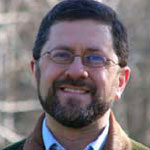 know it is truly coming from someone who has been deeply touched in his depths of his own heart by this tremendous sacrament of love. I love talking with Mike, he strengthens and encourages my own faith so much…he is such a gift to the body of Christ!  In “The Fire of God’s Love” he passes on insights on the Eucharist to inspire us all.  Saints and popes are represented in this collection, but also reflections from folks representing in our own time, like J.R.R. Tolkien,
know it is truly coming from someone who has been deeply touched in his depths of his own heart by this tremendous sacrament of love. I love talking with Mike, he strengthens and encourages my own faith so much…he is such a gift to the body of Christ!  In “The Fire of God’s Love” he passes on insights on the Eucharist to inspire us all.  Saints and popes are represented in this collection, but also reflections from folks representing in our own time, like J.R.R. Tolkien, 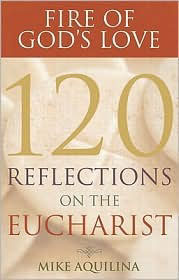 Maria Montessori, Conrad Hilton, and George Wiegel.
Maria Montessori, Conrad Hilton, and George Wiegel.
[powerpress]
Tags: catholic, catholic podcast, catholic prayer, cathollc spirituality, eucharist, eucharistic devotion, holy eucharist, Mike Aquilina More, st. anthony messenger books, st. paul center for biblical theology
This entry was posted on Sunday, June 26th, 2011 at 8:16 am
You can follow any responses to this entry through the RSS 2.0 feed.
Part 2…What a fantastic book, what a fantastic (and fun) interview with Dr. Brant Pitre, discussing “Jesus and the Jewish 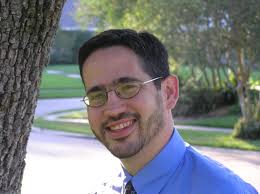 Roots of the Eucharist”. This book has what it takes to become a classic, similiar in importance as Dr. Scott Hahn’s “The Lamb’s Supper”!
Roots of the Eucharist”. This book has what it takes to become a classic, similiar in importance as Dr. Scott Hahn’s “The Lamb’s Supper”!
The description from the book says it best….“Jesus and the Jewish Roots of the Eucharist shines fresh light on the Last Supper by looking at it through Jewish eyes. Using his in-depth knowledge of the Bible and ancient Judaism, Dr. Brant Pitre answers questions such as: What was the Passover like at the time of Jesus? What were the Jewish hopes for the Messiah? What was Jesus’ purpose in instituting the Eucharist during the feast of Passover? And, most important of all, what did Jesus mean when he said, “This is my body… This is my bloodâ€?
To answer these questions, Pitre explores ancient Jewish beliefs about the Passover of the Messiah, the miraculous Manna from heaven, and the mysterious Bread of the Presence. As he shows, these three keys—the Passover, the Manna, and the Bread of the Presence—have the power to unlock the original meaning of the Eucharistic words of Jesus. Along the way, Pitre also explains how Jesus united the Last Supper to his death on Good Friday and his Resurrection on Easter Sunday.
Inspiring and informative, Jesus and the Jewish Roots of the Eucharist is a groundbreaking work that is sure to illuminate one of the greatest mysteries of the Christian faith: the mystery of Jesus’ presence in “the breaking of the bread.â€
[powerpress]
and be sure to check out Dr. Brant Pitre’s excellent website!
Tags: ancient judaism, brant pitre, catholic, catholic podcast, catholic prayer, cathollc spirituality, doubleday religion, eucharist, Jesus, mysteries, work
This entry was posted on Monday, February 14th, 2011 at 7:58 am
You can follow any responses to this entry through the RSS 2.0 feed.
Episode 12 -The Way of Mystery: The Eucharist and Moral Living– 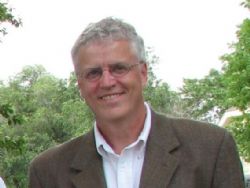 The Liturgy of the Eucharist part 4 : the Communion Rite…The moment of radical surrender…can we do it? We when come forward to communion, what are doing…what are we saying? Will we allow ourselves to be transformed? The moment of silence…will we allow ourselves to be transformed within so we can go out to transform the culture for Christ?
The Liturgy of the Eucharist part 4 : the Communion Rite…The moment of radical surrender…can we do it? We when come forward to communion, what are doing…what are we saying? Will we allow ourselves to be transformed? The moment of silence…will we allow ourselves to be transformed within so we can go out to transform the culture for Christ?
[powerpress]
Deacon James Keating, PhD, the director of Theological Formation for the Institute for Priestly Formation, located at Creighton University, in Omaha, is making available to â€Discerning Hearts†and all who listen, his series of programs entitled “The Way of Mysteryâ€.
 The Vatican II documents remind us that the spiritual journey is not made in a vacuum, that God has chosen to save us, not individually, but as The People of God. The Eucharist must help Christians to make their choices by discerning out of Christ’s paschal mystery. For this process to take place, however, Christians must first understand how the Eucharist puts them in touch with Christ’s passion, death, and resurrection, and what concrete implications being in touch with this mystery has for their daily lives.
The Vatican II documents remind us that the spiritual journey is not made in a vacuum, that God has chosen to save us, not individually, but as The People of God. The Eucharist must help Christians to make their choices by discerning out of Christ’s paschal mystery. For this process to take place, however, Christians must first understand how the Eucharist puts them in touch with Christ’s passion, death, and resurrection, and what concrete implications being in touch with this mystery has for their daily lives.
For more information on the “Institute of Priestly Formation†and for other material available by Deacon Keating, just click here
Don’t forget to pickup a copy of “Communion with Christ†, it is one of the best audio sets on prayer…ever!
Check out Deacon Keating’s “Discerning Heart†page
Tags: catholic, catholic podcast, catholic prayer, cathollc spirituality, Christ Episode 12, communion rite, creighton university, Deacon James Keating, eucharist, institute for priestly formation, james keating, paschal mystery, the eucharist, theological formation, way of mystery
This entry was posted on Sunday, January 30th, 2011 at 12:53 pm
You can follow any responses to this entry through the RSS 2.0 feed.
Episode 6 -The Way of Mystery: The Eucharist and Moral Living–  The Penitential Rite part 2 Are we afraid of silence, being alone with God, posture, and The domestic church.
The Penitential Rite part 2Â Are we afraid of silence, being alone with God, posture, and The domestic church.
[powerpress]
Deacon James Keating, PhD, the director of Theological Formation for the Institute for Priestly Formation, located at Creighton University, in Omaha, is making available to â€Discerning Hearts†and all who listen, his series of programs entitled “The Way of Mysteryâ€.
 The Vatican II documents remind us that the spiritual journey is not made in a vacuum, that God has chosen to save us, not individually, but as The People of God. The Eucharist must help Christians to make their choices by discerning out of Christ’s paschal mystery. For this process to take place, however, Christians must first understand how the Eucharist puts them in touch with Christ’s passion, death, and resurrection, and what concrete implications being in touch with this mystery has for their daily lives.
The Vatican II documents remind us that the spiritual journey is not made in a vacuum, that God has chosen to save us, not individually, but as The People of God. The Eucharist must help Christians to make their choices by discerning out of Christ’s paschal mystery. For this process to take place, however, Christians must first understand how the Eucharist puts them in touch with Christ’s passion, death, and resurrection, and what concrete implications being in touch with this mystery has for their daily lives.
For more information on the “Institute of Priestly Formation†and for other material available by Deacon Keating, just click here
Don’t forget to pickup a copy of “Communion with Christ†, it is one of the best audio sets on prayer…ever!
Check out Deacon Keating’s “Discerning Heart†page
Tags: catholic, catholic podcast, catholic prayer, cathollc spirituality, communion, creighton university, Deacon James Keating, discerning heart, eucharist, institute for priestly formation, james keating, paschal mystery, pentential rite, prayer, spiritual journey, the eucharist, the mass, theological formation, way of mystery
This entry was posted on Saturday, November 27th, 2010 at 5:55 pm
You can follow any responses to this entry through the RSS 2.0 feed.
Episode 4 -The Way of Mystery: The Eucharist and Moral Living–  Prayer and our truly active participation in the Mass: the introductory rite, and the Liturgy of the Word
Prayer and our truly active participation in the Mass: the introductory rite, and the Liturgy of the Word
[powerpress]
Deacon James Keating, PhD, the director of Theological Formation for the Institute for Priestly Formation, located at Creighton University, in Omaha, is making available to â€Discerning Hearts†and all who listen, his series of programs entitled “The Way of Mysteryâ€.
 The Vatican II documents remind us that the spiritual journey is not made in a vacuum, that God has chosen to save us, not individually, but as The People of God. The Eucharist must help Christians to make their choices by discerning out of Christ’s paschal mystery. For this process to take place, however, Christians must first understand how the Eucharist puts them in touch with Christ’s passion, death, and resurrection, and what concrete implications being in touch with this mystery has for their daily lives.
The Vatican II documents remind us that the spiritual journey is not made in a vacuum, that God has chosen to save us, not individually, but as The People of God. The Eucharist must help Christians to make their choices by discerning out of Christ’s paschal mystery. For this process to take place, however, Christians must first understand how the Eucharist puts them in touch with Christ’s passion, death, and resurrection, and what concrete implications being in touch with this mystery has for their daily lives.
For more information on the “Institute of Priestly Formation†and for other material available by Deacon Keating, just click here
Don’t forget to pickup a copy of “Communion with Christ†, it is one of the best audio sets on prayer…ever!
Check out Deacon Keating’s “Discerning Heart†page
Tags: catholic, catholic podcast, catholic prayer, cathollc spirituality, Deacon James Keating, eucharist, institute for priestly formation, introductory rite, liturgy of the word, mass, moral living, paschal mystery, the eucharist, theological formation, way of mystery
This entry was posted on Sunday, November 14th, 2010 at 3:52 pm
You can follow any responses to this entry through the RSS 2.0 feed.
Episode 1 -The Way of Mystery: The Eucharist and Moral Living–  Placing the Eucharist as the center of who we are as Catholics part 1
Placing the Eucharist as the center of who we are as Catholics part 1
[powerpress]
Deacon James Keating, PhD, the director of Theological Formation for the Institute for Priestly Formation, located at Creighton University, in Omaha, is making available to â€Discerning Hearts†and all who listen, his series of programs entitled “The Way of Mysteryâ€.
 The Vatican II documents remind us that the spiritual journey is not made in a vacuum, that God has chosen to save us, not individually, but as The People of God. The Eucharist must help Christians to make their choices by discerning out of Christ’s paschal mystery. For this process to take place, however, Christians must first understand how the Eucharist puts them in touch with Christ’s passion, death, and resurrection, and what concrete implications being in touch with this mystery has for their daily lives.
The Vatican II documents remind us that the spiritual journey is not made in a vacuum, that God has chosen to save us, not individually, but as The People of God. The Eucharist must help Christians to make their choices by discerning out of Christ’s paschal mystery. For this process to take place, however, Christians must first understand how the Eucharist puts them in touch with Christ’s passion, death, and resurrection, and what concrete implications being in touch with this mystery has for their daily lives.
For more information on the “Institute of Priestly Formation†and for other material available by Deacon Keating, just click here
Don’t forget to pickup a copy of “Communion with Christ†, it is one of the best audio sets on prayer…ever!
Check out Deacon Keating’s “Discerning Heart†page
Tags: catholic, catholic podcast, catholic prayer, cathollc spirituality, creighton university, Deacon James Keating, eucharist, institute for priestly formation, james keating, the eucharist, theological formation, vatican ii documents, way of mystery
This entry was posted on Wednesday, October 27th, 2010 at 12:41 am
You can follow any responses to this entry through the RSS 2.0 feed.
Episode 2 – The Mass: the Universal Sign
Roots of the Faith – From the Church Fathers to You with Mike Aquilina,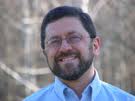 makes clear that just as an acorn grows into a tree and yet remains the same plant, so the Catholic Church is a living organism that has grown from the faith of the earliest Christians into the body of Christ we know today. Hosted by Kris McGregor
makes clear that just as an acorn grows into a tree and yet remains the same plant, so the Catholic Church is a living organism that has grown from the faith of the earliest Christians into the body of Christ we know today. Hosted by Kris McGregor
[powerpress]
Also visit Mike’s “Discerning Hearts†page for more audio downloads and information!
Tags: catholic, catholic podcast, catholic prayer, cathollc spirituality, church fathers, early church, eucharist, eucharistic liturgy, mike aquilina, servant books, the mass, the Universal Sign Roots
This entry was posted on Wednesday, September 15th, 2010 at 2:50 pm
You can follow any responses to this entry through the RSS 2.0 feed.

